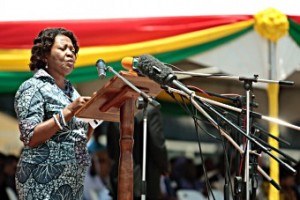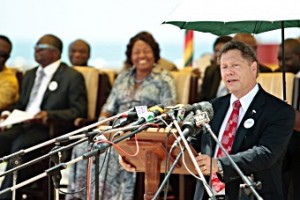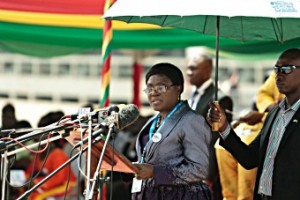Simultaneous introduction is first in African history

Globally, pneumonia and severe infant diarrhoea together take the lives of more than 2.7 million children under the age of five each year. In Ghana, these killer diseases together account for approximately 20% of the country’s under-five child mortality.
Special ceremony
Ghana’s First Lady H.E. Dr Ernestina Naadu Mills was joined today by the country’s Minister of Health Hon. M Alban S. K. Bagbin, GAVI Alliance CEO Dr Seth Berkley, WHO Deputy Director General Dr Anarfi Asamoa-Baah, UNICEF Country Representative Dr Iyabode Olusanmi and other international guests at a special ceremony in Accra, where the first doses of the vaccines were administered to children. Hundreds of participants gathered to celebrate this historic milestone in public health.
“Today is a great day for Ghanaians as we have the opportunity to improve the lot of our children, who are our greatest resource. The future of our country lies in our children,” said the First Lady, who also gave one of the first rotavirus vaccine doses at the ceremony in Independence Square.
“Our children have been dying from these vaccine-preventable diseases for too long, but this moment begins a major fight back,” said Health Minister Hon. Alban S. K. Bagbin. “With these vaccines, we want to, and we will, achieve MDG4, the two-thirds reduction of our child mortality by 2015.”
A new milestone
Ghana’s historic rollout today marks a new milestone in a global initiative to reach children in developing countries with vaccines against the leading childhood killers. Pneumococcal and rotavirus vaccines have respectively reached 17 and six GAVI-supported countries in the last couple of years, and are expected to reach more than 40 countries by 2015.

The vaccines have been financed with generous contributions from GAVI donors and co-financed by the Government of Ghana. More than 400,000 Ghanaian children will be immunised against pneumococcal disease thanks to a £1.5 million contribution by JP Morgan, which was matched by the UK through the GAVI Matching Fund for a total contribution of £3 million.
Globally, the GAVI Alliance’s support for pneumococcal vaccines could prevent more than seven million deaths by 2030. By the same date, GAVI’s support for rotavirus vaccines could save another 2.4 million child deaths.
Ghana’s commitment
Ghana’s commitment to public health through immunisation has been consistently improving since 1978 when the Expanded Programme on Immunisation was launched.
“Immunisation rates for infants in Ghana now stand at over 90%,” said Dr Anarfi Asamoa-Baah, Deputy Director-General for WHO. “In addition to the strong routine immunisation programme, the country also conducts supplemental immunisation activities to reduce the incidence of diseases such as polio, measles and yellow fever.”
By preventing disease, Ghana’s double launch will also prevent the time and cost of expensive medical care and treatment, contributing to poverty reduction and a growing economy. Treating rotavirus diarrhoea among children in Ghana, for example, costs the West African nation an estimated US$ 3.2 million per year.
Behaviour change

“To ensure that children’s lives are saved, parents need to acknowledge that vaccination is good for their children’s health, that they should complete their vaccination calendar. By doing so, we will in turn increase demand for immunisation, improve attitudes and practices and positively influence social norms that will promote sustainable change,” she added.
The rollout was also made possible thanks to the close collaboration of all GAVI Alliance members including innovative partnerships with manufacturers to make vaccines available sooner for children in developing countries and at a fraction of the price charged in industrialised countries.
Source:www.gavialliance.org
